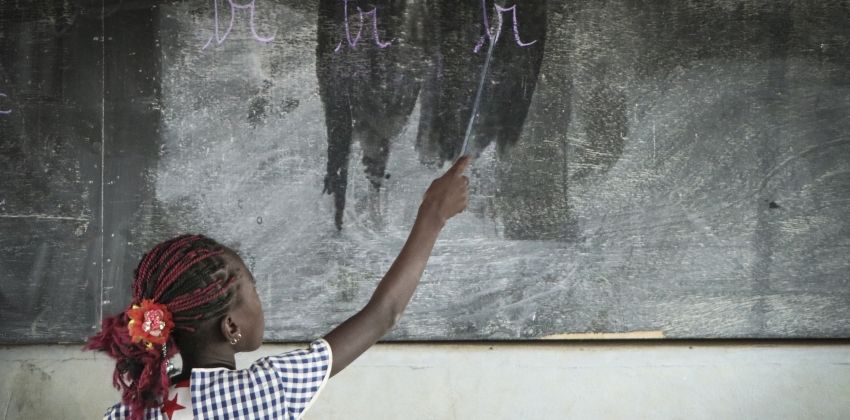Share Content
Article Link Copied
Against child labor – joint forces to promote quality education

- A strong coalition of the Ivorian government, companies of the cocoa and chocolate industry and philanthropic partners aims to jointly tackle root causes of child labor in Côte d’Ivoire
- The coalition intends to structure two initiatives with a total target capitalization of 150 million Swiss francs and boost quality education and early childhood development
To support the development of its human capital and tackle the root causes of child labor, the government of Côte d’Ivoire has developed a National Action Plan to Combat Child Labor, has launched a 10-year Education Sector Strategy and has introduced a Multisectoral Plan for Nutrition. A strong coalition of philanthropic partners and 11 companies of the cocoa and chocolate industry is now ready to join forces with the Ivorian government to support its strategic objectives to combat child labor and provide a good start in life and quality education for all children. A decisive milestone has been reached on April 15, when the Council of Ministers of the Ivorian government committed to an agreement laying the ground for this unprecedented public private partnership.
Threat of COVID-19 virus
In the face of the challenges associated with COVID-19, this public private partnership becomes more important than ever. To protect its population from the threat of COVID-19 virus, the Ivorian government, as many governments in other parts of the world, has closed schools. While important from a public health perspective, this measure will significantly impact learning and development opportunities of Ivorian children. Learning hours per child will simply be lost. The World Bank further warns that the Coronavirus will push Sub-Saharan Africa into recession, which would place increasing pressure on farmer incomes, and research shows that when household incomes decrease, child labor tends to increase.
Strong partners
The Jacobs Foundation and the UBS Optimus Foundation as well as the Ivorian government and the cocoa and chocolate companies Barry Callebaut, Cargill, Chocolonely Foundation, ECOM, Ferrero, The Hershey Company, Mars Wrigley, Mondelēz International, Nestlé, ofi and Touton intend to jointly provide the necessary seed funding to launch two pooled funding facilities with a target capitalization of 150 million Swiss francs to promote effective learning and early childhood development at scale in Côte d’Ivoire. To reach the target capitalization for the two facilities, additional stakeholders are invited to join the coalition.“
“This is a unique opportunity to come together and rigorously address the root causes of child labor and promote quality education in a systemic manner”, says Fabio Segura, Co-CEO of Jacobs Foundation. “All partners strongly believe that only joint forces will ultimately bring sustainable change.”
Two initiatives to boost quality education and early childhood development
The first of the two funding initiatives, the Child Learning and Education Facility (CLEF), aims to reach 5 million children and 10 million parents in cocoa growing areas and beyond, focusing on access to quality primary education.
The second initiative, the Early Learning and Nutrition Facility (ELAN), is designed to reach 1.3 million children below the age of 5 and their caregivers, providing quality services and training in early childhood development and nutrition.
“Collaborative philanthropy is critical to addressing the greatest challenges facing vulnerable populations. We are proud to stand alongside the Jacobs Foundation, the government of Côte d’Ivoire and the corporate sector in support of advancing quality education across the country”, says Phyllis Kurlander Costanza, Head UBS in society and CEO UBS Optimus Foundation.
Blueprints for effective public private partnerships
Côte d’Ivoire leads the world in the production and export of cocoa beans for the manufacture of chocolate. Yet, a 2015 survey found more than 1 million children were performing hazardous work in cocoa production in Côte d’Ivoire. In rural Ivorian areas, nearly 30% of primary school-aged children are out of school, while the percentage rises to 50% for children of lower secondary school age (Côte d’Ivoire MICS 2016). Among those who are in school, the majority do not reach the minimum expected level in reading and math. This poor school performance is largely attributable to low quality education, but also to suboptimal development in the early years of children’s lives. With a national rate of 30% of stunting, which is especially dangerous for young children, Côte d’Ivoire is among the most vulnerable countries in
Sub-Saharan Africa. Without better early childhood development and access to quality education, these children are at higher risk of child labor.
Around the world, more than 150 million children may be affected by child labor. The CLEF and ELAN initiatives represent a multi-stakeholder partnership that is seeking a sustainable solution to this situation in Côte d’Ivoire. These initiatives could serve as blueprints for effective public private partnerships to help achieve the UN Sustainable Development Goals.
Learn more about CLEF and ELAN under:
jacobsfoundation.org/en/activity/clef-elan/